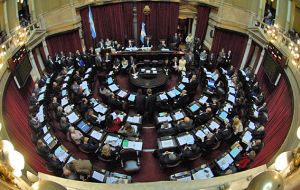MercoPress. South Atlantic News Agency
Governance post-June 28 takes hold of Argentine electoral campaign
 Kirchner fear the loss of congregational majority
Kirchner fear the loss of congregational majority Argentine mid term elections have given a nasty turn as more opposition candidates are calling for “an orderly transition” that ensures governance from the day after June 28 until the end of the current presidential mandate of Cristina Fernandez de Kirchner.
The “us or chaos” alternative which triggered the current debate was first launched by her husband and former president Nestor Kirchner, --the strong man of the government--, and later expanded by wife Cristina when she said that next June 28 “not only the continuity of the model is at stake, but also democratic stability and quality”.
“We must be prudent; we must build an orderly transition. With two years for a change of government we must ensure no more improvisations”, said Francisco De Narvaez who leads the main opposition ticket in the province of Buenos Aires which represents over 35% of the Argentine electorate.
“It was the Lady President who first said the democratic system was at stake, maybe it’s time she apologizes for such a statement”, he added.
There have been insistent rumours in Buenos Aires that if the Kirchner couple is defeated next June, thus loosing control of Congress they could abandon government. This however is hard to see happening with Mr. Kirchner, (a political animal), although Cristina is a question mark since she is the weak side of the couple that has dominated, arrogantly and ruthlessly, Argentine politics since 2003.
In a rare interview, a more conciliatory Kirchner said it was nonsense to believe that Cristina would not to rule until 2011. “This has never been in our political analysis”, he insisted adding that “anyhow we are winning comfortably”.
However public opinion polls tendencies indicate something different in the province of Buenos Aires which is divided into three main rings: middle class urban; working class urban and rural areas.
Traditionally the working class ring has been the stronghold of the ruling Peronist party and represents over 50% of the province’s electorate. So having a solid vote in this ring can compensate the adversity of the urban middle class and farmers. But this apparently is not happening and the ticket for the Lower House, headed by Kirchner is just above that of De Narvaez, which if sustained indicates the loss of control over Congress.
The relatively popular current governor of the province of Buenos Aires Daniel Scioli came out in defence of government criticising the opposition for having forecasted the end of the “Kirchner cycle”.
“I appeal to all those of us who have institutional responsibilities to act with prudence; we can’t alarm fellow citizens about the near future this way; we can’t say and repeat that institutional consolidation conditions are non existent”, underlined Scioli.
He promised to keep working so “the campaign turns out symbolically into a flush of ideas and not a storm of insults”.
Sometimes when the opposition wants to change the focus of the campaign “they choose to question governance instead of addressing peoples’ real problems such as keeping jobs, ensuring economic activity and a good articulation between the Executive and the Legislative”, said Scioli.
.




Top Comments
Disclaimer & comment rulesCommenting for this story is now closed.
If you have a Facebook account, become a fan and comment on our Facebook Page!